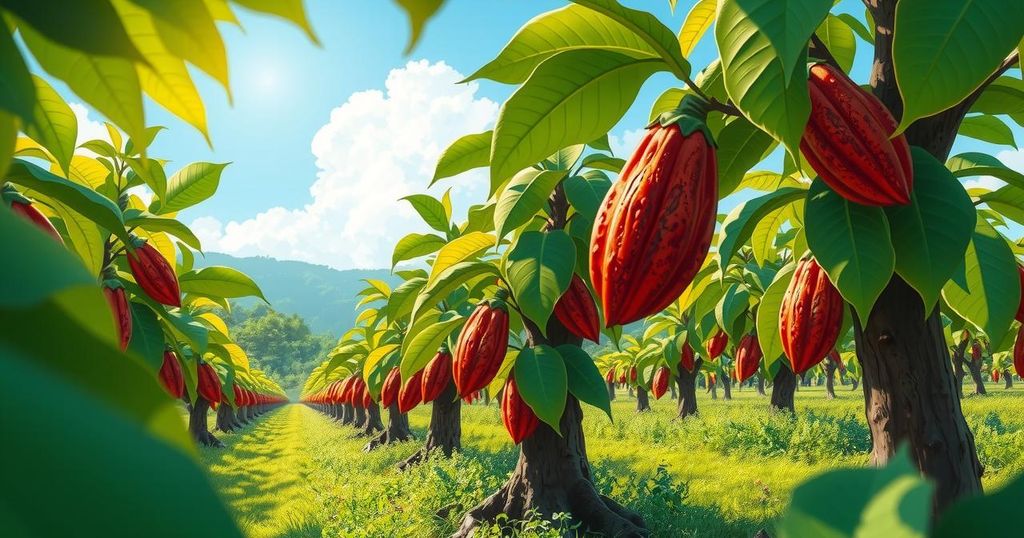Nigeria’s cocoa production has dramatically declined, capturing only 6% of the global market share, a stark drop from its historical status as the world’s second-largest cocoa producer. A proposed new National Cocoa Management Board (NCMB) could help revitalize the industry and sustain livelihoods. The board aims to enhance production coordination, financial accessibility for farmers, and promote domestic processing while navigating emerging global market demands. However, challenges remain, particularly in meeting strict international regulations and competing against aggressive global producers.
Nigeria’s cocoa industry, once a titan on the global stage, has slumped to producing a mere 6% of world supply, trailing behind the heavyweights like Côte d’Ivoire and Ghana. The decline can largely be traced back to the oil boom of the 1970s, which drew attention and investment away from agriculture. A new proposal to set up the National Cocoa Management Board (NCMB) aims to reverse this trend, presenting a potential lifeline for the beleaguered industry and the millions whose livelihoods depend on it.
Historically, from the 1940s to the 1970s, cocoa was a cornerstone of the Nigerian economy, contributing nearly half of national exports. This period saw the emergence of regional marketing boards—most notably, the Western Nigeria Cocoa Marketing Board—which provided critical support to smallholder farmers through research and price stability. Unfortunately, the centralization of these boards during military rule, combined with issues like corruption and insufficient infrastructure, led to stagnation. Farmers began facing delays in payment and struggled with diseases like the swollen shoot virus, which severely impacted production levels.
The situation worsened in 1986 when the national cocoa board was dissolved, paving the way for a liberalized market that lacked coordination and support. Farmers became increasingly exposed to price fluctuations without access to crucial credit or modern harvesting techniques. Current production lies between 200,000 and 300,000 metric tonnes, far behind Ghana’s 700,000 and Côte d’Ivoire’s 1.8 million tons.
The Minister of Agriculture and Food Security, Abubakar Kyari, proposes the NCMB as the solution to these longstanding issues. Its objectives are wide-ranging: coordinate production, enhance marketing, provide accessible credit, and promote domestic processing while engaging youth and encouraging climate-smart practices. If implemented well, the NCMB could restore stability and improve quality standards, which are crucial for competing in international markets.
Another critical factor is the current lack of local processing; Nigeria processes less than 10% of its cocoa. This limitation results in significantly lower earnings for Nigerian producers, at around $750 per tonne of raw beans, versus $4,000 per tonne for processed goods in Europe. To revitalize the industry, a shift from being price-takers to producers of value-added cocoa products, such as chocolate, is essential.
Despite the hopeful outlook, a recent Vestance report cites numerous challenges ahead. Global market dynamics are shifting, and regulations like the European Union Deforestation Regulation (EUDR) necessitate traceability and sustainable sourcing. For Nigeria’s smallholder farmers—often financially strapped and lacking digital infrastructure—this poses significant hurdles, risking market exclusion.
Meanwhile, countries like Ecuador and Brazil are making strides up the value chain, investing in premium flavors and strong processing sectors, which puts Nigeria at risk of falling behind. Observations from Ghana and Côte d’Ivoire’s cocoa boards, which have achieved price stability for farmers, could offer vital lessons. But those models are marred by their issues, such as inefficiencies and subsidy disputes that leave farmers disadvantaged.
To effectively revamp the cocoa sector, the NCMB should adopt a governance approach that incorporates private sector input and farmer representation while fostering an ecosystem that supports coordination over rigid price controls. Moving toward a dynamic pricing system tied to global trends could benefit farmers in fluctuating markets.
The NCMB’s mandate must prioritize essential farmer needs—like better access to research, improved credit options, and enhanced farming practices. Close partnerships with research institutions and community services are integral to overcoming the infrastructural challenges that plague the sector.
Finally, aligning the cocoa value chain with international regulatory frameworks and employing technology for transparency and efficiency will be crucial. Legal safeguards, such as performance audits and oversight from the National Assembly, will help to ensure the NCMB remains focused on promoting real value chain development.
The formation of the NCMB is an encouraging development for Nigeria’s cocoa industry, but its success will rely on avoiding past pitfalls and embracing current realities. A thriving cocoa economy will need coordinated support in infrastructure, financing, research, access to markets, and diligent oversight. There’s much work to do to make this vision a reality.
In conclusion, the proposed National Cocoa Management Board (NCMB) represents a pivotal move towards reviving Nigeria’s cocoa industry. By learning from past failures and incorporating private sector input and farmer perspectives, the NCMB could stabilize prices, enhance production quality, and transition Nigeria into the value-added cocoa market. However, confronting both internal challenges and stringent international regulations will determine whether this board can effectively reinvigorate a once-thriving sector.
Original Source: businessday.ng






